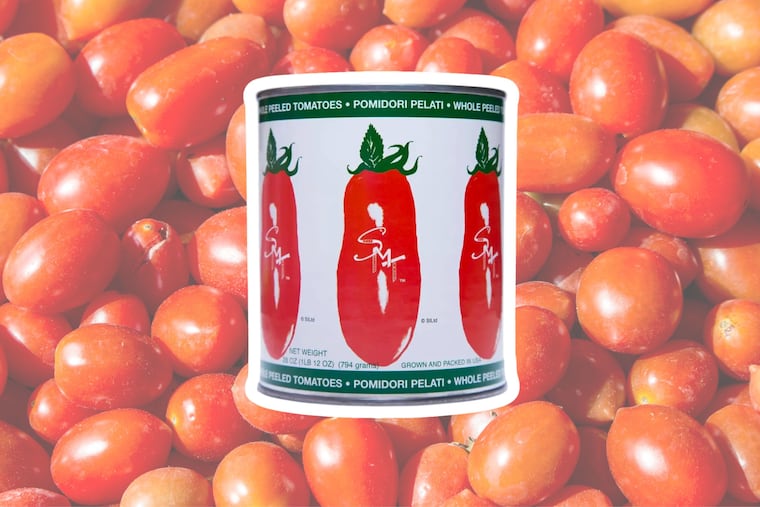Woman sues Jenkintown tomato seller over misleading packaging claims
The lawsuit alleges that Simpson Imports Ltd. has used “highly misleading tomato packaging” on its canned and boxed San Merican Tomatoes.

A California woman was duped into buying “inferior” Roma tomatoes instead of the San Marzano tomatoes she was expecting thanks to the misleading packaging used by a Jenkintown-based tomato seller, according to a lawsuit that will proceed in federal court in California.
Simpson Imports Ltd. has used “highly misleading tomato packaging” on its canned and boxed San Merican Tomatoes, Andrea Valiente, of Campbell, Calif., claims in the lawsuit filed last year. Valiente alleges consumers like her are being tricked “into believing that they are purchasing genuine San Marzano tomatoes, at San Marzano prices.”
Instead, they’re getting a blend of “round, firm, acidic” Roma tomatoes, which don’t live up to the quality — or price — of highly sought-after San Marzano tomatoes, the lawsuit claims.
Simpson initially sought to have the lawsuit dismissed. But this week, a California judge ruled that Valiente’s lawsuit could continue with a few amendments. She has until mid-March to refile.
“Simpson Imports strongly disputes that reasonable consumers could have been deceived by Simpson Imports’ labels into thinking they were purchasing San Marzano tomatoes,” the company said in a statement. “Given the very high quality of the tomato products that Simpson Imports sells, and the complete absence of any reference to ‘San Marzano’ on the label, it is hard to find any legitimate basis for Plaintiff’s claim.”
At issue is Simpson’s packaging for its “San Merican Tomatoes” brand, abbreviated as SMT. Valiente alleges that the packaging includes illustrations of tomatoes that look like San Marzano tomatoes, and the brand’s SMT abbreviation can be “reasonably understood” to mean “San Marzano Tomato.”
The label also includes a “comically minuscule” label spelling out San Merican Tomatoes, which Valiente claims consumers would take to mean “San Marzano varietal tomatoes grown in North America.” And, Valiente added, Simpson used to sell actual San Marzanos in similar packaging — though it has not done so in about a decade — which adds further confusion for consumers.
In its statement, Simpson said that its SMT tomatoes are a “proprietary blend” of other tomato varietals. Among them are Roma tomatoes, which the company said were created in the 1950s with help from U.S. Department of Agriculture “by selectively breeding San Marzano tomatoes with Pan-American tomatoes.” As a result, the SMT brand name “was intended to be and is a play on words,” and its labels are “fully compliant” with Food and Drug Administration regulations, the company said.
The tomato image used on the packaging, meanwhile, is “a hand-drawing of a Roma tomato that the company’s founder did when he was a child,” Simpson said.
A home cook, Valiente says in the lawsuit that she, like others, prefers to use San Marzano tomatoes because they have a “stronger, sweeter, less acidic taste” that makes them “perfectly suited for making sauces.” Roma tomatoes, on the other hand, have qualities that lead to them “consistently producing a less desirable sauce.”
As a result, San Marzano tomatoes typically command higher prices than other canned varieties, including Roma tomatoes. But Simpson’s SMT tomatoes are allegedly often much more expensive than similar brands of varietal blends, fetching $5.99 for a 28-ounce can. Other comparative cans go for $2.59 to $3.79, the lawsuit alleges.
“No reasonable consumer would spend two or three times as much for tomatoes that offer nothing over their cheaper counterparts,” the lawsuit says.
Simpson countered in its statement that the words “San Marzano” do no appear anywhere on the SMT products’ labels, and haven’t in about 10 years, when the company changed its blend of tomatoes.
The judge’s order noted that it is “plausible” that consumers would miss the “San Merican Tomato” text, and be led to “reasonably believe that Simpson’s tomatoes are San Marzano tomatoes.” The tomatoes’ pricing “further contributes to the plausibility of a consumer’s expectations that Simpson’s tomatoes are San Marzano tomatoes,” the order added.
The order, however, did acknowledge that Valiente’s “allegations about how she reached certain conclusions” about the label are lacking. As a result, the court is allowing her to file an amended complaint to further clarify her case.
According to the complaint, Valiente is seeking compensatory, statutory, and punitive damages in an amount to be determined by the court, as well as “other forms of equitable monetary relief.” Valiente’s attorney did not respond to a request for comment.
Simpson, meanwhile, said it is prepared to continue the battle in court.
“Simpson Imports looks forward to defeating Plaintiff’s claims while continuing its mission to provide high-quality tomato products to consumers who know and love the brand,” the company said.